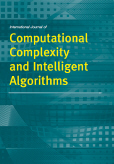Forthcoming Articles
International Journal of Computational Complexity and Intelligent Algorithms

There are currently no forthcoming papers for this journal.
Register for our alerting service, which notifies you by email when new issues are published online.